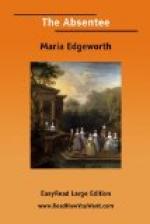There was to be a concert this night at Lady Clonbrony’s, at which Mrs. and Miss Broadhurst were, of course, expected. That they might not be quite unprepared for the event of her son’s going to Ireland, Lady Clonbrony wrote a note to Mrs. Broadhurst, begging her to come half an hour earlier than the time mentioned in the cards, ’that she might talk over something particular that had just occurred.’
What passed at this cabinet council, as it seems to have had no immediate influence on affairs, we need not record. Suffice it to observe, that a great deal was said, and nothing done. Miss Broadhurst, however, was not a young lady who could be easily deceived, even where her passions were concerned. The moment her mother told her of Lord Colambre’s intended departure, she saw the whole truth. She had a strong mind—was capable of drawing aside, at once, the curtain of self-delusion, and looking steadily at the skeleton of truth—she had a generous, perhaps because a strong mind; for, surrounded, as she had been from her childhood, by every means of self-indulgence which wealth and flattery could bestow, she had discovered early, what few persons in her situation discover till late in life, that selfish gratifications may render us incapable of other happiness, but can never, of themselves, make us happy. Despising flatterers, she had determined to make herself friends to make them in the only possible way—by deserving them. Her father made his immense fortune by the power and habit of constant, bold, and just calculation. The power and habit which she had learned from him she applied on a far larger scale; with him, it was confined to speculations for the acquisition of money; with her, it extended to the attainment of happiness. He was calculating and mercenary: she was estimative and generous.
Miss Nugent was dressing for the concert, or, rather, was sitting half-dressed before her glass, reflecting, when Miss Broadhurst came into her room. Miss Nugent immediately sent her maid out of the room.
‘Grace,’ said Miss Broadhurst, looking at Grace with an air of open, deliberate composure, ’you and I are thinking of the same thing—of the same person.’
‘Yes, of Lord Colambre,’ said Miss Nugent, ingenuously and sorrowfully.
’Then I can put your mind at ease, at once, my dear friend, by assuring you that I shall think of him no more. That I have thought of him, I do not deny—I have thought, that if, notwithstanding the difference in our ages, and other differences, he had preferred me, I should have preferred him to any person who has ever yet addressed me. On our first acquaintance, I clearly saw that he was not disposed to pay court to my fortune; and I had also then coolness of judgment sufficient to perceive that it was not probable he should fall in love with my person. But I was too proud in my humility, too strong in my honesty, too brave, too ignorant; in short, I knew nothing of the matter. We are all of us, more or less, subject to the delusions of vanity, or hope, or love—I—even I!—who thought myself so clear-sighted, did not know how, with one flutter of his wings, Cupid can set the whole atmosphere in motion; change the proportions, size, colour, value, of every object; lead us into a mirage, and leave us in a dismal desert.’




